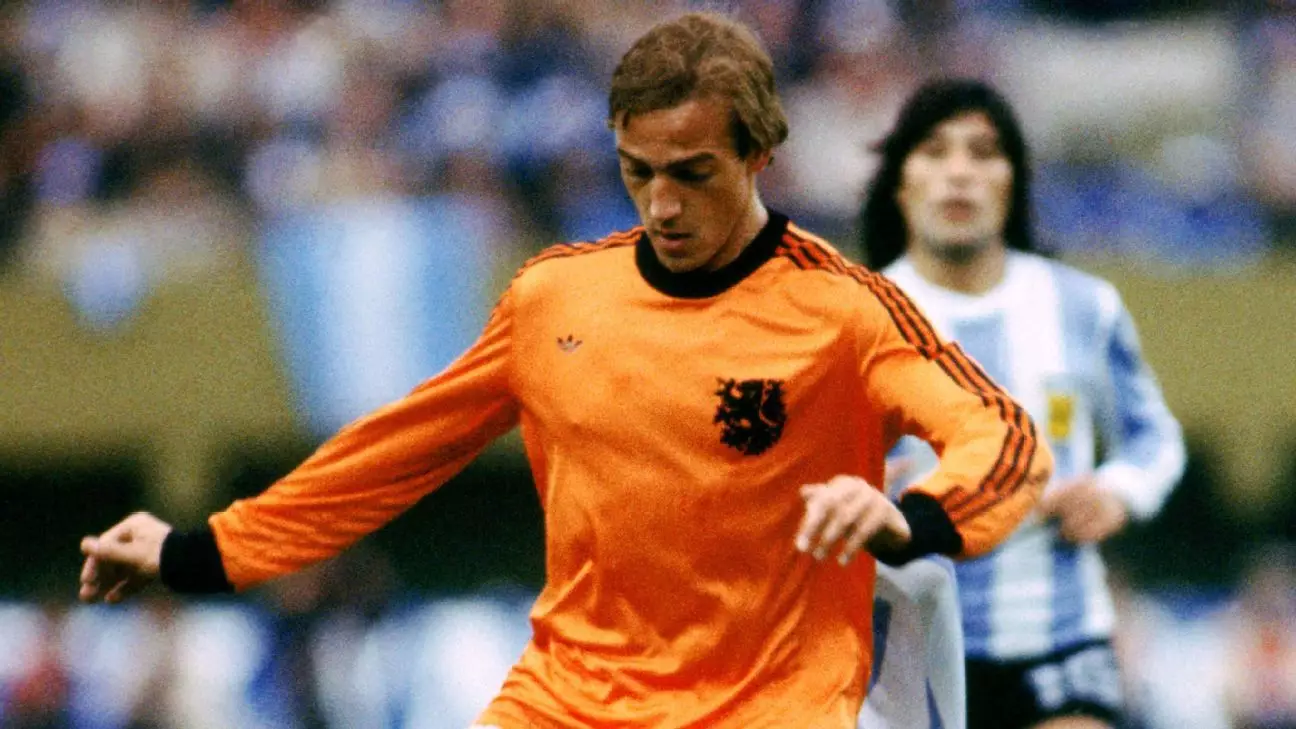Johan Neeskens, a name synonymous with the golden era of Dutch football, has left us at the age of 73. The news of his passing, which occurred in Algeria while he was engaged in a coaching project for the Dutch Football Association (KNVB), has sent shockwaves through the football community. Though details regarding the cause of his death remain undisclosed, the profound impact of his life and career is unmistakable.
Neeskens was not just an exceptional player; he represented an entire philosophy of football that defined a generation. Alongside legends like Johan Cruyff, he played a pivotal role in what became known as “total football,” a tactical approach that emphasized fluidity, teamwork, and versatility on the field. His prowess as a midfielder was underscored by his ability to seamlessly transition between defensive responsibilities and attacking opportunities. This duality was a cornerstone of the Dutch team’s style in the 1970s, creating a brand of football that was both aesthetically pleasing and profoundly effective.
Despite Neeskens’ individual brilliance, he experienced heartbreak in two World Cup finals. In 1974, he netted a penalty that gave the Netherlands an early lead against West Germany in Munich, yet the match ended in disappointment with a 2-1 loss. He famously remarked, “The most beautiful football doesn’t always win,” a statement that captures the essence of his insights into the game. The artistry of the Dutch approach, while visually mesmerizing, was unable to secure the ultimate prize on that occasion. In 1978, history repeated itself when the Netherlands once again fell short, this time to Argentina, showcasing a cruel twist of fate for a team overflowing with talent.
Beyond international glory, Neeskens carved out an extraordinary club career. His time at Ajax was characterized by dominance, winning the European Cup three times during the early ’70s. These victories contributed significantly to Ajax’s reputation as a European powerhouse and solidified Neeskens’ status as one of the leading figures in club football. Following his successful stint at Ajax, he joined Barcelona, further enhancing his legacy in La Liga before taking his talents to the United States with the New York Cosmos. These transitions were not just career moves; they were emblematic of the evolving landscape of football, as Neeskens ventured into different leagues and cultures, leaving an indelible mark wherever he played.
The response to Neeskens’ passing has been unified and heartfelt. Ajax commemorated him as a “legend,” conveying the club’s deep-seated respect for his contributions. Barcelona echoed these sentiments by honoring him as a “blaugrana legend,” emphasizing that his spirit and talent would forever resonate within the club’s history. Such reverence highlights not only his skill set but also his ability to inspire future generations of players.
Neeskens understood and articulated one of football’s most essential truths: the collective triumphs far outweigh individual accolades. During a reunion of players from the 1974 World Cup team, he stated, “The collective, that’s what it’s all about.” This philosophy speaks volumes about his character and approach to football. Neeskens recognized that success in football relies on teamwork, collaboration, and a shared vision. It’s a sentiment that echoes throughout the sport and serves as a reminder that true greatness is often achieved collectively.
After hanging up his boots, Neeskens continued to nurture talent by stepping into coaching roles. He served as an assistant coach both for the Dutch national team and for Australia’s football programs, demonstrating his commitment to developing the next generation of players. His influence endured, shaping strategies and mentoring upcoming stars as they navigated their own paths in the beautiful game.
As we reflect on the life and career of Johan Neeskens, we celebrate not just the player but the person who touched the lives of many. His dedication to football, significant contributions to his teams, and the indelible spirit he brought to the game will forever remain in our memories. In the realm of football, icons may pass, but their legacies continue to inspire. Neeskens’ impact will be felt long after his departure, a testament to a life beautifully lived on and off the pitch.

